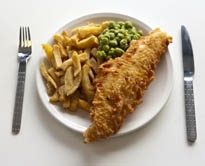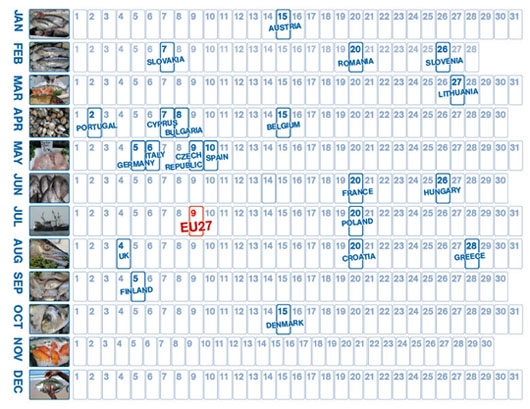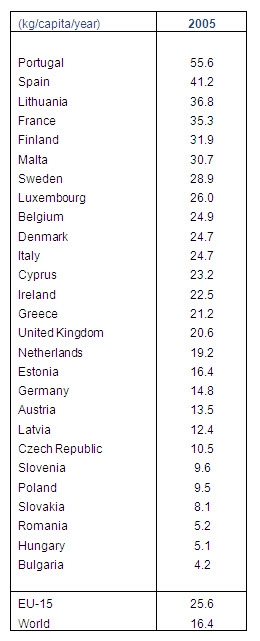Today Europe Blows its Annual Fish Budget
New research reveals that Europe could not feed itself on fish for more than 189 days a year, and is from July 9 dependent on imports
A report released today by NEF (New Economics Foundation) and OCEAN2012 reveals EU citizens are consuming more and more fish than European seas currently produce, thereby becoming increasingly dependent on seafood from other waters.
Fish Dependence: The increasing reliance of the EU on fish from elsewhere, shows the extent to which Europeans are importing fish by exporting overfishing. Fish stocks are a renewable resource. According to latest figures from the European Commission, 72 per cent of assessed fish stocks in European waters are overfished.

”The European Union is endowed with the largest and some of the richest fishing grounds in the world. Having failed to manage them responsibly, it is now exporting overfishing to other parts of the world”, said Aniol Esteban, from NEF and OCEAN2012. “Restoring our marine ecosystems while matching fish consumption with available resources is the obvious way to stop this damaging trend.”
This report emphasizes that if people want sustainable seafood then they must ensure decision-makers enact responsible fisheries policy. The reform of the EU’s Common Fisheries Policy must ensure the viability of European fisheries rather than importing increasing quantities of fish by exporting overfishing. Aniol Esteban
Report findings
- If the EU were only to consume fish from its own waters, it would run-out of fish on July 8th, making it wholly dependent on imported fish from around the world from July 9th based on current levels of consumption.
- Since 2000, the EU’s Fish Dependence Day has occurred earlier and earlier in the year and is now nearly a month sooner, revealing an increasing level of fish dependence.
- For a number of member states the specific date from which they become dependent on fish imports is: Spain, May 10; Portugal, April 2; France, June 20; Germany, May 5; Italy, May 6; and UK, August 4.
- The effects of EU overfishing of its own fish stocks are masked by the increasing amounts of fish imported from elsewhere.
- Growth in aquaculture has failed to halt our increasing dependence on fish from elsewhere.
Contact
For more information or to arrange an interview please contact:
Andy Wimbush, Communications Officer, NEF (New Economics Foundation).
Tel: +44 (0)207 820 6383 Mob: +44 (0)773 914 3503
E-mail: [email protected]
Aniol Esteban, NEF Head of Environmental Economics
Tel: +44 (0)207 820 6323 Mob: +44 (0)7951 648 914
E-mail: [email protected]
More information
Download a full version of the report 1MB; 32 pages
- NEF (New Economics Foundation) is an independent think-and-do tank that inspires and demonstrates real economic well-being. We aim to improve quality of life by promoting innovative solutions that challenge mainstream thinking on economic, environment and social issues. We work in partnership and put people and the planet first.
- OCEAN2012 is an alliance of organisations dedicated to transforming European Fisheries Policy to stop overfishing, end destructive fishing practices and deliver fair and equitable use of healthy fish stocks.
- OCEAN2012 was initiated, and is co-ordinated, by the Pew Environment Group, the conservation arm of The Pew Charitable Trusts, a non-governmental organisation working to end overfishing in the world´s oceans.
- The founding members of OCEAN2012 are the Coalition for Fair Fisheries Arrangements (CFFA), the Fisheries Secretariat (FISH), NEF (New Economics Foundation), the Pew Environment Group and Seas At Risk (SAR).
Fish Dependence Day Calendar

Table 1: Fish Consumption per capita for EU countries

Source: Fishery and Aquaculture statistics. FAO yearbook 2007.






